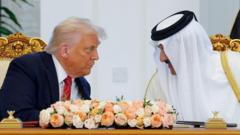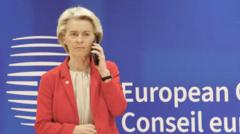Over 400 British artists, including prominent figures like Sir Elton John and Dua Lipa, have taken a stand by urging the UK Prime Minister to modify copyright policies in order to safeguard their creative works from unauthorized exploitation by AI technologies.
Legends Unite: Artists Demand Stronger Copyright Protection Against AI

Legends Unite: Artists Demand Stronger Copyright Protection Against AI
Artists including Elton John and Dua Lipa urge UK Prime Minister to fortify copyright laws as AI technology evolves.
The letter calls for clarity in how developers use their original content for AI training.
Dua Lipa, Sir Elton John, Sir Ian McKellen, and Florence Welch, among other stars, are united in their call for the UK Prime Minister to enhance copyright protections against the encroachment of artificial intelligence. They argue that the absence of such protections would lead to the unauthorized appropriation of their creative works by technology firms.
In a collective letter containing over 400 signatures from musicians, writers, and artists, these creatives have reached out to Sir Keir Starmer, cautioning that neglecting copyright reform could jeopardize the UK's status as a vibrant cultural hub. The signatories are advocating for support of an amendment to the Data (Use and Access) Bill, which would mandate transparency from developers regarding the use of creators’ works for training AI models.
A government spokesperson has acknowledged the concerns, assuring that they aim to foster the growth of both the creative sector and AI industry. They suggested a willingness to consider necessary amendments once they are certain they benefit creators adequately.
Among those who signed the letter are notable figures like Kazuo Ishiguro, David Hare, Kate Bush, and Robbie Williams. Sir Paul McCartney, who previously expressed worries about AI misappropriating artists’ work, is also on board. "We are the innovators of the future; AI requires us as much as it requires data and technology expertise," they state.
The artists are particularly supporting a proposed amendment by Baroness Beeban Kidron, which could enable both AI developers and creators to establish licensing systems for continued human-generated content.
Contrasting opinions exist, however, with some critics claiming that such regulations could hamper the UK’s technological growth. Julia Willemyns from the Centre for British Progress argues that restrictions could lead to foreign competition benefiting while stifling domestic innovation.
Amid growing unease regarding the inclusion of copyrighted material in AI training sets, artists are voicing their discontent. Notably, this past February, artists like Annie Lennox and Damon Albarn engaged in a silent album project to protest government plans that would potentially benefit big tech firms at the expense of individual creators.
The government previously consulted on a proposal allowing developers to utilize online content unless rights holders opted out, yet backlash from creators appears to prompt a reconsideration.
Mr. Ishiguro also commented previously on the need for fair treatment of creators, questioning the fairness of modifying longstanding copyright laws to favor corporate giants.
Baroness Kidron has reiterated that her proposed amendments would engender needed transparency, ultimately fostering robust licensing options between AI companies and creators.
The government's commitment to further consultations and economic assessments reflects their recognition of the complex dynamics at play in both the creative and tech industries.
As the UK stands on the brink of becoming a competitive player in the global AI arena, the emphasis placed on transparency and fairness in copyright law may prove essential in shaping the future of creative collaboration in this new digital age.
Dua Lipa, Sir Elton John, Sir Ian McKellen, and Florence Welch, among other stars, are united in their call for the UK Prime Minister to enhance copyright protections against the encroachment of artificial intelligence. They argue that the absence of such protections would lead to the unauthorized appropriation of their creative works by technology firms.
In a collective letter containing over 400 signatures from musicians, writers, and artists, these creatives have reached out to Sir Keir Starmer, cautioning that neglecting copyright reform could jeopardize the UK's status as a vibrant cultural hub. The signatories are advocating for support of an amendment to the Data (Use and Access) Bill, which would mandate transparency from developers regarding the use of creators’ works for training AI models.
A government spokesperson has acknowledged the concerns, assuring that they aim to foster the growth of both the creative sector and AI industry. They suggested a willingness to consider necessary amendments once they are certain they benefit creators adequately.
Among those who signed the letter are notable figures like Kazuo Ishiguro, David Hare, Kate Bush, and Robbie Williams. Sir Paul McCartney, who previously expressed worries about AI misappropriating artists’ work, is also on board. "We are the innovators of the future; AI requires us as much as it requires data and technology expertise," they state.
The artists are particularly supporting a proposed amendment by Baroness Beeban Kidron, which could enable both AI developers and creators to establish licensing systems for continued human-generated content.
Contrasting opinions exist, however, with some critics claiming that such regulations could hamper the UK’s technological growth. Julia Willemyns from the Centre for British Progress argues that restrictions could lead to foreign competition benefiting while stifling domestic innovation.
Amid growing unease regarding the inclusion of copyrighted material in AI training sets, artists are voicing their discontent. Notably, this past February, artists like Annie Lennox and Damon Albarn engaged in a silent album project to protest government plans that would potentially benefit big tech firms at the expense of individual creators.
The government previously consulted on a proposal allowing developers to utilize online content unless rights holders opted out, yet backlash from creators appears to prompt a reconsideration.
Mr. Ishiguro also commented previously on the need for fair treatment of creators, questioning the fairness of modifying longstanding copyright laws to favor corporate giants.
Baroness Kidron has reiterated that her proposed amendments would engender needed transparency, ultimately fostering robust licensing options between AI companies and creators.
The government's commitment to further consultations and economic assessments reflects their recognition of the complex dynamics at play in both the creative and tech industries.
As the UK stands on the brink of becoming a competitive player in the global AI arena, the emphasis placed on transparency and fairness in copyright law may prove essential in shaping the future of creative collaboration in this new digital age.





















